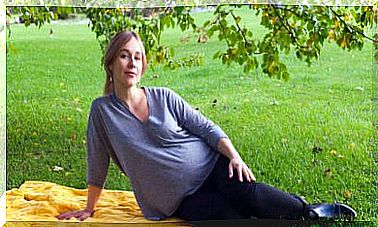Is It Necessary To Give Vitamins To Babies?

Many mothers wonder if it is necessary to give their babies a vitamin supplement to supplement their diet. During the first stages of life, nutrition is exclusively based on breastfeeding. In this sense, some women may think that this diet would be insufficient in terms of micronutrients.
However, we cannot disregard that breast milk is the most complete food for children, having all the necessary nutrients to promote adequate growth. Except when there are problems with breastfeeding, as in the case of low milk production, the energy and substances provided are sufficient.
The vitamin content of breast milk
As a general rule, breast milk contains all the vitamins the child needs for proper growth. It is considered the most complete and appropriate food, according to a study published in the journal Current Opinion in Pediatrics . It not only has nutrients, but also bioactive substances that promote the proper functioning of the immune system.

However, it is true that there is a vitamin that is not present in this food, or at least not in amounts needed by the baby. We’re talking about vitamin D, a nutrient that also has hormonal functions.
The best way to get the proper dose of vitamin D is by promoting exposure to the sun, so it’s critical that babies are taken outside often. By means of ultraviolet radiation, the endogenous synthesis of vitamin D is stimulated, which allows to satisfy the requirements without problems.
However, it is not possible to guarantee frequent exposure to sunlight for babies in all countries, mainly due to local climatic conditions. This absence can lead to a deficit of this element. To avoid this, the alternative of vitamin supplementation was proposed.
Vitamin Supplements in Babies
According to a study published in the journal Nutrients , vitamin D supplementation in children may be positive if they are deficient in the nutrient. This nutritional strategy helps prevent immune and hormonal imbalances, thus reducing the incidence of certain complex pathologies.
However, it is always advisable to consult a professional before offering supplements for babies. That’s because not all vitamin D products are suitable for children. Furthermore, there is no need to resort to this strategy in all cases, not at all times of the year.
The ideal would be to introduce the supplement into the diet when the demands of solar radiation cannot be satisfied. And also if there are signs of rickets, as this pathology develops from the nutrient deficit.
On the other hand, some precautions should be taken with the use of sunscreens in babies. These products almost completely block the production of endogenous vitamin D, due to an excessive defense against solar radiation. For this reason, it is important to ensure that the baby is exposed to light for a period of time without a protector, while following preventive measures against skin damage.
Vitamin D dosage during supplementation
Vitamin D supplements are generally prescribed for children under 6 months who are not exposed to the sun long enough. In such cases, oily solutions with a content of 400 IU of the nutrient per day are used. However, from the sixth month onwards, the dosage schedule may vary, as many formula milks are fortified with the vitamin.

Also in the case of premature babies, there may be different needs. In this case, the vitamin will be prescribed according to the child’s weight and the type of food offered.
It’s important to give babies vitamins
As you’ve seen, giving babies vitamin D can be critical to ensuring good development. It is important to consult the doctor first and administer the nutrient according to the time of year and the child’s diet.
In addition to this element, it is not recommended to supplement with any other nutrients during the early stages of life. At least in the case of babies who don’t have pathologies. Breast milk contains all the nutrients needed to meet the needs of the little ones.








